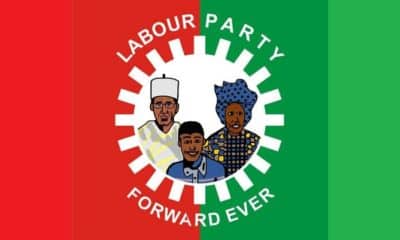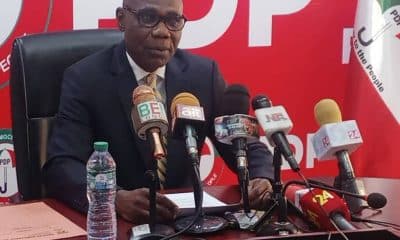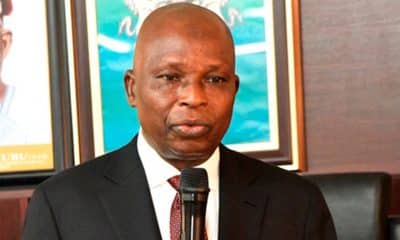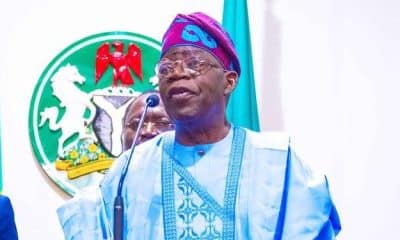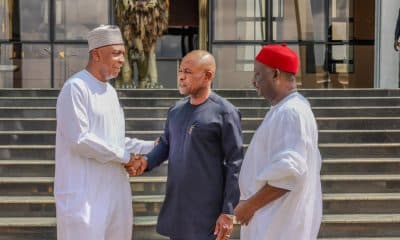Politics
One-Party State: ‘There Will Be An Implosion In APC, It May Happen Before Primary Election’ – Expert Predicts
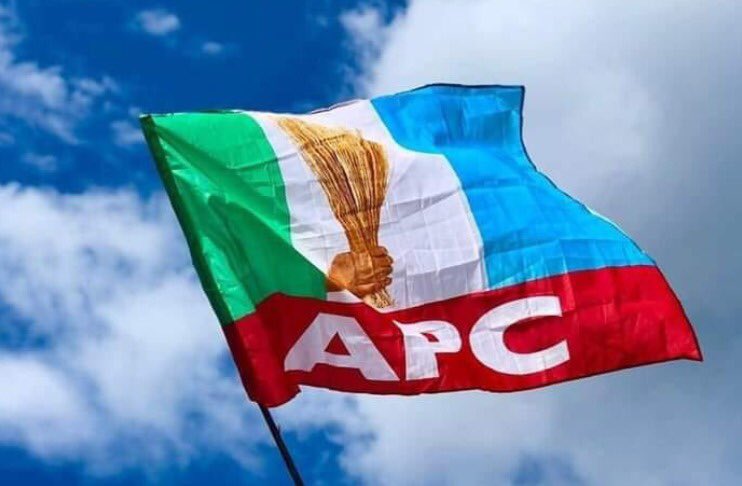
The recent wave of defections from opposition parties into the ruling All Progressives Congress (APC), while seemingly a boost to the ruling party’s numerical strength, may in fact herald a period of internal strife and political instability for the party.
These defections, often driven more by personal ambition and survival than ideological alignment, risk upsetting the delicate balance of power within the APC and igniting fierce internal rivalries.
Moreover, the influx of former opposition figures into the APC may erode the party’s identity and confuse its core supporters. Many of these defectors were, until recently, harsh critics of the APC’s policies and leadership.
Their sudden integration into the fold without clear accountability or ideological clarity could undermine the credibility of the party’s message and alienate loyal members who feel their sacrifices are being disregarded in favour of political expediency.
Naija News reports that this ideological dilution could weaken the APC’s appeal to voters who value consistency and principled leadership.
They Are Seeking Re-election
In an exclusive interview with Naija News, renowned political analyst Jide Ojo, noted that most of the state governors defecting to the APC are doing so to secure their second term ticket.
“Politics is a game of interest. There is no permanent friendship with anything. And when you see all those governors defecting to the APC, they are seeking reelection. Sheriff Oborevwori is seeking election in Delta State, and he saw that he may not be able to get a second term unless he joins the APC,” Ojo noted.
“But the problem that will come out of it now is that those who have been there within the party, people like Omo-Agege, Festus Keyamo. He is now their leader. So when the party primary comes, he would want to determine who gets what, when and how. He would want to determine who will go to the House of Representatives, who will go to the State Assembly, and they will remind him when did you joined this party? You met us here.
“Many of them will now return to the PDP. The same thing will happen in every state.”
“You know, in the past, journalists would describe some states as PDP, APC, ANPP, and APGA states. If Soludo sees that he will not get a second term, he can decide to join the APC. You will now see that it is not based on any ideology or principle. All of them that are looking for a ticket, because mainly that is the dominating factor… Only a few are there because of an appointment or contract. The contract cannot go around everybody.
“Appointments should go around everybody. But when you go because you want a ticket, by the time you don’t get that ticket, what happens? You move,” Jide Ojo added.
One-party State
Ojo believes that Nigeria is already a de facto one-party state since the incumbent administration took over power.
“Let’s not deceive ourselves, we are now a de facto one-party state. That is why I sent you my article earlier. I tried to explain it… What do you mean by we are one one-party state? What is a two-party state? We have de facto and de jure one-party and two-party states and multi-party states.
“And when you say the U.S. is a two-party state, it doesn’t mean that only two political parties exist there. It doesn’t mean that there are only two political parties in the UK or in Ghana.
“In Ghana, there are about 15 political parties. But there are two dominant ones. And so in Nigeria, for a brief period, we have the two major parties till 2019.
“But from 2023, it has become a one-party state because you can see how all the opposition parties are defecting more or less to the APC. So, a de facto one-party state but a de jure multi-party state,” the political analyst noted.
There Will Be An Implosion In APC Before 2027
“There will be an implosion before 2027. There will be an implosion in APC; that one is predictable; you don’t have to be a soothsayer or be a Nostradamus,” said Ojo.
Ojo made this remark while highlighting the danger of the wave of defection of opposition party leaders into the APC, a development seen as a strategic move by the ruling party to turn the country into a one-party state.
The political analyst stressed that: “Legally speaking, Nigeria is a de jure multiparty democracy but a de facto one-party state. Given the mass defection of elected governors, federal and state lawmakers from opposition political parties into the All Progressives Congress, Nigeria is now a de facto one-party state because the remaining 18 are too weak to pose a serious electoral challenge to the dominant APC.
“This was the scenario that played out in this country between 1999 and 2015, when the Peoples Democratic Party held sway at the centre. The popular cliché then was PDP and others. When this reference was being made, Nigeria moved from three registered political parties to having 91 registered parties by 2011, before many of them were deregistered by INEC after the 2011 General Election, and 74 were left to contest the 2015 general election.
“Further deregistration by INEC, by the powers conferred on the commission by Section 225A of the Nigerian Constitution, has led to a manageable 19 that we currently have now.”
Ojo added: “It is important to note that countries that are presumed to have a two-party system, such as Ghana, the UK and the US, are actually multiparty democracies. In the US, there are dozens of political parties. The two dominant parties are the Republican Party and the Democratic Party. Other parties, often generally termed “third parties”, in the US include the Green Party, Libertarians, the Constitution Party and the Natural Law Party. In the United Kingdom, the dominant political parties are the Conservative and Labour Parties. However, according to the BBC, there are several different parties in the UK, each with different ideas and policies.
“The largest parties include the Liberal Democrats, the United Kingdom Independence Party, the Green Party, the Scottish National Party, Plaid Cymru in Wales, and the DUP and Sinn Féin in Northern Ireland. In Ghana, the Electoral Commission indicated that there are 15 parties registered at the time of the 2024 general election. However, the dominant parties are the National Democratic Congress and the New Patriotic Party.”
Concluding his argument, Ojo stressed that there will be an implosion in the APC. He is optimistic that it could happen before the party’s primary election next year.
The political analyst said the “new entrants may want to determine what happens within the party, while those who have been there will say no, we have been here before you, you cannot come and dictate to us.”
Naija News reports observed that these internal battles often spill into the public domain, projecting an image of disunity and instability.
While defections may momentarily swell the APC’s ranks, as new power blocs emerge, long-standing members may feel threatened or sidelined, leading to a crisis of trust and cohesion within the party’s ranks.

